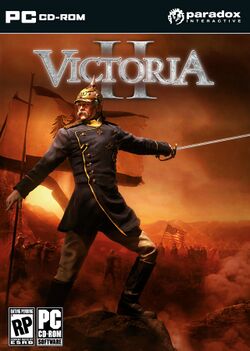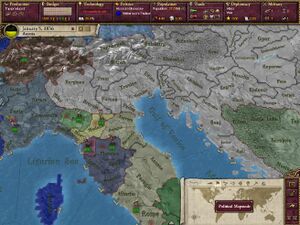| 开发商 | Paradox Development Studio |
| 发行商 | Paradox Interactive |
| 游戏引擎 | 克劳塞维茨引擎 |
| 发布 | 2010年8月13日[1] |
| 游戏类型 | 即时大战略游戏 |
| 游戏模式 | 单人和多人游戏 |
| 配置要求 | |
|---|---|
| 系统 | Windows XP/Vista/7/10 |
| 处理器 | Intel® Pentium® IV 2.4 GHz
AMD 3500+ |
| 内存 | 2Gb RAM |
| 硬盘空间 | 2 GB |
| 显卡 | NVIDIA® GeForce 8800
ATI Radeon® X1900 |
| 声卡 | DirectX® compatible |
| 控制器 | 鼠标,键盘和扬声器 |
| 多人游戏需求 | 网络连接 |
维多利亚2 是一款大战略战争游戏,由Paradox Development Studio开发,Paradox Interactive发行,是2003年维多利亚 的续集。它于2009年8月19日宣布,并于2010年8月13日发布。
2010年9月17日,Virtual Programming发布了这款游戏的OS X版本。
和它的前作一样,维多利亚2允许玩家控制和管理一个19世纪的民族国家,包括它的政治、外交、经济、军事和科技方面。
游戏
维多利亚2游戏时间从1836年开始到1936年结束,横跨全球有超过200个可玩的国家。与前作一样,维多利亚2注重内部管理,游戏内容涵盖了在多种不同政府类型的国家的工业化和社会/政治变革。这款游戏通过拥有超过50种商品和工厂[1]的复杂市场体系,赋予了管理国家的经济很大的重要性。虽然战争是这款游戏的一个组成部分,但却不像《钢铁雄心》系列等Paradox游戏将其作为主要关注点。[2]
国家人口按文化、宗教和职业划分。成为多个不同的人口群体或称“pops”,包括贵族、军官、牧师、资本家、职员、技工、士兵、劳工和农民。维多利亚2引入了两个新的人群,手工业者和官僚。在其他Paradox游戏中,如《欧陆风云》,历史任务是整场游戏中的微目标。还有成千上万的历史事件和决议。[1]这些事件和民族主义可能导致民族国家的建立或解体。[3]
维多利亚2与它的前作相比包含了许多变化和改进。同最早的前作游戏相比,它的界面更加流畅,制作人Johan Andersson说,这是“被上帝遗忘的界面”。增加了各种操作的自动化,包括调整贸易和人口。教育系统已经进行了彻底的改革,让牧师教育相同宗教的人,现在每个人群都有自己的文化水平。教育和识字的重要性反映在包含数千项发明的庞大科技体系中。[1]此外,游戏中意识形态的作用也有所调整,即人口群体对本国情况的变化更加敏感,并倾向于推动特定层次的政治和社会改革。[4]
经济
维多利亚2的经济体系试图模拟世界市场中资源的流动。游戏中的每个省份都会在资源生产作业(或称为RGO)中产生一种资源。[5]有些资源,比如小麦,它主要是你的人口需要。其他原料,如铁会被工业消耗,但仍然可以交易。
维多利亚2的生产和失业机制经过了修改,以更好地反映市场运作。在最初,国家为资源提供资金,而玩家拥有广泛的选择来建立他们的经济体系,只要他们能够获得适当的原材料。所有资源都可以由工业收集或生产。这款游戏还有一个模拟工业化前经济的生产系统。[1]
外交
维多利亚2包含了深度的政治模拟,其表现在几十种不同类型的政府,新的势力范围系统,炮舰外交和新的选举系统与联合政府和上议院。[1]
维多利亚2的外交与其他Paradox游戏的外交很相似。每个国家都有一个-200到+200的关系值,这表示他们有多喜欢对方。外交和游戏行动会改变这种关系,并将其融入AI决策中。然而,Paradox Interactive已经扩展了这个系统的部分内容。来自欧陆风云3的扩展包《王朝血脉》的战争目标已经被整合进了游戏,尽管它们的功能略有不同。随着战争的进行,你可以添加更多的战争目标,尽管这确实会影响人民的情绪。未能实现战争目标将增加人口的斗争性,从而导致叛乱。
在游戏中,控制一个列强可以提供其他国家所不具备的特殊外交选项。列强不仅能影响一个国家如何看待它们;他们还有能力利用自己对其他国家的影响力来改变他国对其他列强的看法。列强在世界各地的影响力斗争不是简单的双边相互,而是在多个不同的国家内相互发生,这给外交增加了一个维度,而这在最初的维多利亚中是不存在的。
Warfare
Warfare is regarded as a lesser priority than politics and economics in Victoria II, though it follows the basic pattern used in other Paradox grand strategy games, with armies moving between provinces and engaging enemy armies and capturing enemy territory. The basic combat system is a combination of the systems used in Europa Universalis 3, Europa Universalis: Rome and Hearts of Iron III. A key component to combat is "frontage": the number of units in an army at the front line, which decreases as technology improves to simulate the change from roving armies to the continuous trench lines of World War I.[6]
Several aspects of the military have been changed from Victoria. The base unit has been reduced from a 10,000-unit division to a 3,000-unit brigade, which is no longer raised from a national manpower pool but directly raised from a provincial soldier POP, to which the brigade remains connected. A new aspect to the military is reconnaissance. This is a value that gives a bonus (or penalty, if low) to capturing provinces and defeating enemy armies; in prolonged combat, however, the reconnaissance value drops. Units such as cavalry and aeroplanes have high reconnaissance values and are intended to be used as scouts.[6]
There are currently two bookmarks with which you can start a campaign in with a choice of any country in the world that existed at that time. Here are both bookmarks with their respective names and descriptions.
Bookmarks
1836, January 1st
The Grand Campaign
The dust has settled on the fields of Waterloo, where the ideals of the French Revolution were believed to have met their final demise at the hands of the Ancient Régimes of Europe. After the tribulations of Napoleon's wars, the consensus established at the Congress of Vienna has restored a tentative calm to a troubled continent. While the flames of revolution may have been put out for now, the ideas of human liberty, nationalism and liberalism will soon prove themselves more alive than ever. In the Americas, those same ideas threaten to plunge a young republic into the devastation of a civil war. Princess Victoria is 16 years old, and will soon ascend to the throne of Great Britain, the greatest industrial empire ever to span the globe. Her ascension, to a long and prosperous reign, marks the beginning of an age that is to last all the way up until the First World War. In this new era of unprecedented technological progress, doubts will be cast on certainties that have stood since time immemorial, and new dogmas will rise in their place. Far away, across the briny foam, the riches of Asia and Africa, and The Heart of Darkness, beckon that their songs may also be heard, in the Concert of Europe. Maestro, choose your instrument, and let the music play.
The initial date plunges you into the early XIXth Century where only a handful of nations have factories and Africa is empty of countries bar a few on the coast. This date is perfect for building a nation up from humble beginnings so that it might rival history and forge its own destiny.
1861, July 1st
American Civil War
Civil war rages in North America as the Confederate States attempt to secede from the Union. The outcome is uncertain, but already this promises to be a new type of war as both sides have access to railroads, telegraphs, and repeating rifles. Meanwhile, in Europe, Great Britain is experimenting with the first iron-hulled steam-driven warship, a combination which promises to revolutionise the war at sea. World wide the industrial revolution is gathering speed as more and more nations start to industrialise. The times they are a-changing.
This bookmark revolves around the American Civil War, a much more challenging conflict than in the previous bookmark, since the player has no time to prepare. There is improved technology and a wider variety of countries have industrialised. A later date means that the game is more likely to carry out more historically accurate.
Development
The decision to create Victoria II was influenced by voting on the Paradox Interactive forums and debate within the company. The CEO of Paradox Interactive, Fredrik Wester, publicly announced his belief that the game would never see a profit while other members of the company such as Johan Andersson were confident it would be profitable. To this end Wester promised that if the game did indeed make a profit he would shave his head and post the pictures onto the forum.[7] This belief stemmed from the first game's lackluster sales numbers. It was revealed in a German interview with Frederik that 70,000 copies would need to be sold in order for Victoria II to be profitable.[8] On 17 June, Jessica Chobot from IGN shaved it off for him.[9]
Expansion packs
A House Divided (AHD) was announced at the Electronic Entertainment Expo 2011 as an expansion pack with an aim on "[improving the] political and economical aspects of the game, with focus on the American Civil War era". It was released February 2, 2012 for Windows and on March 30, 2012 for OS X, although it is currently only available for purchase by download. It includes:
- New starting point in 1861, allowing players to experience the US Civil War from the start.
- Manufacture reasons to go to war with other countries, all in the name of the great game of power.
- Civilize your country with various new reform paths to ultimately become equal to the western nations.
- Invest in building infrastructure and factories in other countries to strengthen their ties to you.
- Deeper political system with new national focus options and new types of reforms.
- A new system of popular movements that can be appeased or suppressed, but if ignored, will become the revolutionaries of tomorrow.
- Improved interface, with more information easily available and improving gameplay.
- China is now divided into cliques, known as substates, allowing for more interaction in the Far East.
Heart of Darkness (HOD) was announced by Paradox on 31 January 2013 and released on 16 April 2013. It includes the following features:
- A brand new colonization system
- A new naval combat system
- Significant changes to land combat
- Introduction of international crises
- Introduction of newspapers which provide information about events around the world
- Tweaks to industrial production
DLC
A selection of smaller DLC has been made available for purchase for Victoria II
- Victoria II: Interwar Spritepack
- Victoria II: Interwar Artillery Spritepack
- Victoria II: Planes Spritepack
- Victoria II: A House Divided - American Civil War Spritepack
- Victoria II: Songs of the Civil War
- Victoria II: German Unit Pack
- Victoria II: Interwar Engineer Unit Pack
Reception
Victoria II received generally favorable reviews, achieving a 75% average on Metacritic as of May 10, 2020.
GameSpot said that there was much less micromanagement than in its predecessor. The reviewer stated: "Thanks to a friendlier interface and tutorials, Victoria II is a lot more playable and enjoyable than its predecessor."[10]
GameShark was less enthusiastic. The reviewer said: "As a strategy game, Victoria II frustrates me. It is an orgy of detail for detail's sake, yet the information I really want never seems to be at hand. The decisions I make seem mostly inconsequential, changing the game only by a slow process of accretion. Modeling has overtaken game design. Watching Victoria II is hypnotic and frequently awe-inspiring. Unfortunately, you only occasionally might want to play it."[11]
| Reviews | |||
|---|---|---|---|
| Reviewer, Publication | Date | Score | Comment |
| Kyle Stegerwald, CPUGamer |
October 10, 2010 | 9.5/10 | Victoria 2 is already better than anything Paradox has done in a very long time, and it has potential in all the right areas: all that’s really needed is some tweaking of formulae and the fleshing out of some weak spots on the map. Saying that it stands head-and-shoulders above all of the scant competition for grand-strategy kingship almost goes without saying. |
| Tom Bitterman, Gaming Nexus |
September 22, 2010 | 8/10 | Grading was difficult. My reasoning follows. It avoids an F due to high concept and ineffable "feel", misses an A for bugs and dodges a C because Paradox will fix them. High concept + shaky execution = wait for the patch. |
| Brett Todd, GameSpot |
August 18, 2010 | 7.5/10 | While it isn't revolutionary enough to win over those who have found Paradox's grand-strategy efforts too grueling in the past, Victoria II is a more accessible version of this demanding style of game. That said, this remains a challenging, intricate experience that won't be for everyone. It still hits you with a learning curve that initially looks like the north face of K2 to the newbie who has never played this sort of game before. The revolt issue is also frustrating when it pops up, especially because it generally does so after you've invested a few decades into a campaign. Still, this is a leap forward from its predecessor, and it does show that Paradox has been listening to its critics and is tying to make its games as mainstream as possible without turning off the hardcore historical strategy fans that are the company's bread and butter. |
| Roger Hargreaves, Metro |
August 17, 2010 | 7/10 | In Short: As impossibly complex as it is deep, but running your own empire proves to be hugely engrossing for those that put in the man hours. Pros: Immense depth and near total freedom in terms of how you play the game and who you play as. The interface isn't as bad as you'd think and the tutorials are very helpful. Cons: The endless complications involved with even apparently simple tasks will put off all but the most committed. Warfare is oversimplified and awkward to orchestrate. |
| Aggregators | |||
| Compiler | Score | ||
| Metacritic | 75 | ||
References
- ↑ 1.0 1.1 1.2 1.3 1.4 1.5 Victoria 2 Announcement, Paradox Plaza
- ↑ Developer Diary 3 – Design Philosophy, Paradox Plaza
- ↑ A Paradox Christmas Carol, Paradox Plaza
- ↑ Developer Diary 11 - PoPs & Issues, Paradox Plaza
- ↑ Dev Diary 4 - The Economic System and why it may seem a little similar, Paradox Plaza
- ↑ 6.0 6.1 Developer Diary 12 - Military, Paradox Plaza
- ↑ A small note from a guy who didn't vote for this project, Paradox Plaza
- ↑ Im Gespräch mit Paradox Interactive, Making Games
- ↑ Jessica Chobot shaving Frederik's head
- ↑ Gamespot
- ↑ GameShark

